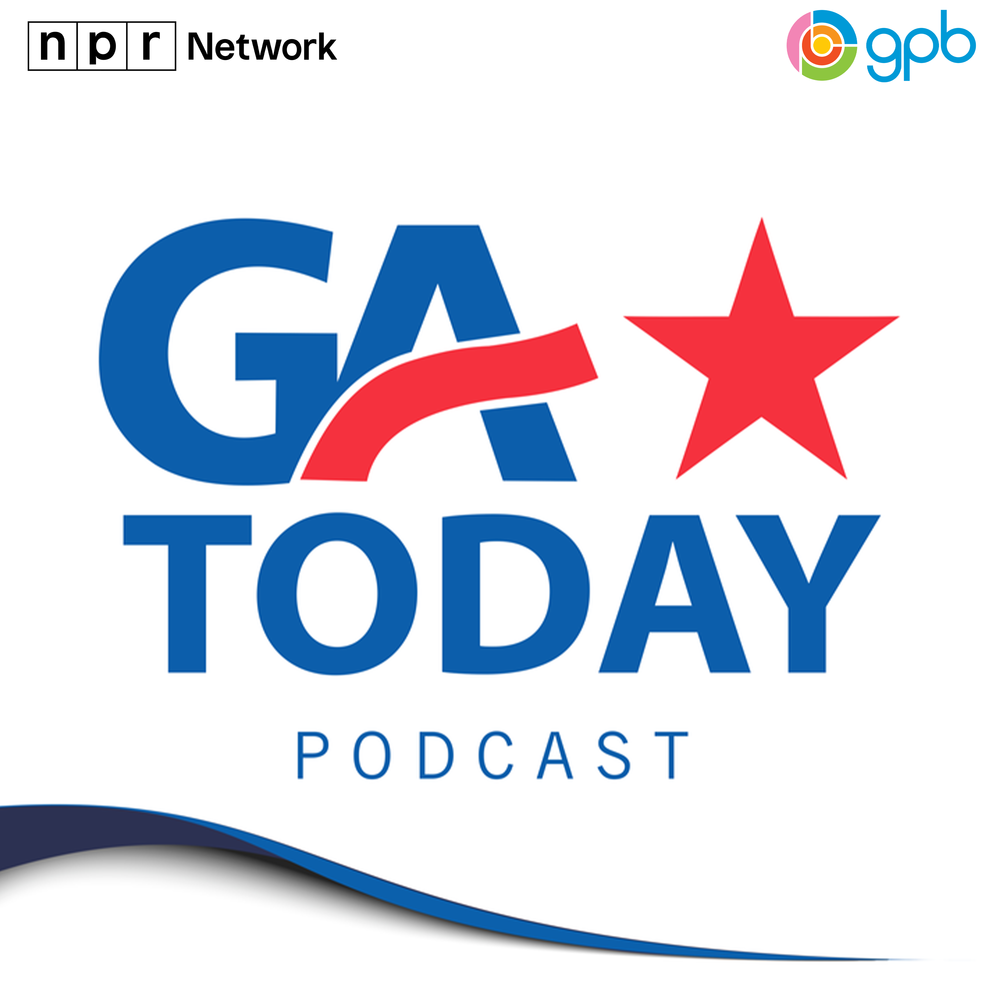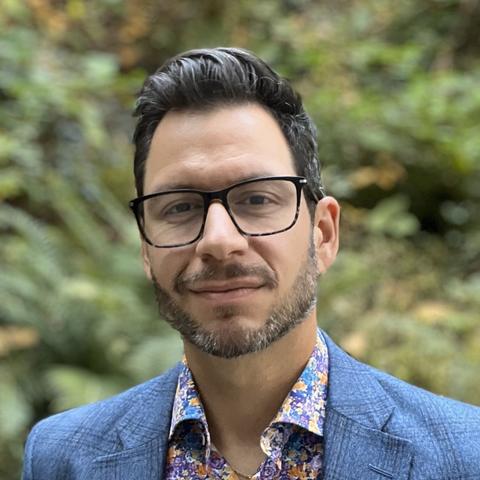
Section Branding
Header Content
Georgia Today: Primary election results; Emory lawsuit over suspension; Atlanta real estate market
Primary Content
LISTEN: On the Wednesday, May 22 edition of Georgia Today: We'll have results from yesterday's primary races; an Emory student challenges his suspension over the creation of an AI tool; and a new study shows Atlantans are sidelined by corporate investors in the real estate market.

Peter Biello: Welcome to the Georgia Today podcast from GPB News. Today is Wednesday, May 22. I'm Peter Biello. On today's episode, we'll have the results from yesterday's primary races. An Emory student challenges his suspension over the creation of an AI tool, and a new study shows Atlantans are sidelined by corporate investors in the real estate market. These stories and more are coming up on this edition of Georgia Today.
Story 1:
Peter Biello: Incumbent Georgia Supreme Court Justice Andrew Pinson has defeated former Georgia congressman John Barrow in a nonpartisan race, where Barrow sought to make abortion rights the central issue. GPB's Sarah Kallis has more on that race and other closely watched outcomes from yesterday's primary elections.
Sarah Kallis: Barrow's challenged to Pinson was unusually heated by the standards of the state's nonpartisan judicial elections. Pinson won a full six-year term after Gov. Brian Kemp appointed him to the court in 2022. Also yesterday, former Donald Trump aide Brian Jack and former state Senate Majority Leader Mike Duggan are advancing to a runoff for the GOP nomination in West Georgia's heavily Republican 3rd Congressional district. And Democratic U.S. House members David Scott and Lucy McBath defeated primary challengers and newly redrawn metro Atlanta districts. Parties also chose their nominees for other House races, state legislative seats, and local offices. Runoffs will be held on June 18 and races where candidates did not win a majority. For GPB News, I'm Sarah Kallis.

Story 2:
Peter Biello: Also, as a result of yesterday's vote, Georgia is one step closer to getting its newest city. Voters in metro Atlanta's Gwinnett County yesterday approved a referendum to create the city of Mulberry. Supporters say the new municipality will give residents more local control, but opponents say they oppose yet another level of government and a legal challenge to the city's charter continues.
Story 3:
Peter Biello: A new variant of COVID, dubbed Flirt, is raising concerns about another summer surge. And in correctional facilities, the risk of infectious diseases spreading remains especially high. New research out of Emory University suggests monitoring wastewater could help prevent outbreaks. GPB's Sofi Gratas has more.
Sofi Gratas: From October 2021 to the following May, Emory epidemiologist Anne Spaulding and others organized COVID testing inside the Fulton County Jail, but they could never get more than a fifth of prisoners tested. It was voluntary, and the jail was already understaffed. So they turned to wastewater collections outside the jail.
Anne Spaulding: And we were able to find the one spot where all of the wastewater would collect. It's a community viral load.
Sofi Gratas: A study published last month from Spalding's research shows wastewater testing was effective and could detect outbreaks before prisoners had COVID symptoms. Spaulding says Georgia corrections facilities could use this to prepare for other outbreaks.
Anne Spaulding: We could restart it in Georgia if there were funds, and if there was an overwhelming public health need. This will not be the last infection that will hit Corrections. It would be best if we didn't have to have people get sick for us to know something was going on.
Sofi Gratas: Sick with COVID and new variants, but also with the flu, norovirus and RSV, diseases that can spread faster among incarcerated people. For GPB News, I'm Sofi Gratas.

Story 4:
Peter Biello: An Emory University student is suing the school for punishing him for making a tool he created with the school's help. Ben Craver created an AI tool meant to help students study. School officials worried the tool could help students cheat. He was suspended for one year. Craver alleges in his suit that Emory had awarded him $10,000 through a business pitch competition to help him develop it. He's asking a federal court to overturn his one-year suspension. The university has not responded to the lawsuit in court or returned a message seeking comment.
Story 5:
Peter Biello: A group of nonprofits is working to help a thousand families in metro Atlanta go from living in motels to stable, permanent housing by June of next year. GPB's Amanda Andrews reports.
Amanda Andrews: The Motel to Home Alliance is a group of eight organizations addressing homelessness by providing housing to families currently living in motels. The groups are conducting outreach, providing financial assistance, and working with families to find and stay in stable housing long term. Mary Grace King is the executive director of Frontline Housing, one of the nonprofits in the alliance. She says many of those she helps are from working families.
Mary Grace King: It is homelessness, but it just looks a lot different than your street homelessness — person living on the street. It's someone who's paying, but they don't have a lease and they don't have rights or even a kitchen.
Amanda Andrews: The Southern Poverty Law Center reports over 25,000 people in the Atlanta metro area are using motels as their residences. For GPB News, I'm Amanda Andrews.
Story 6:
Peter Biello: Residents in Northwest Georgia's Floyd and Polk counties now can access a number of community services by dialing 211. The region's United Way is behind the newly launched effort. Its director, Ali Mitchell, says the number could be a lifeline for people in need.
Ali Mitchell: The difference between a person who becomes homeless and a person who does not is a safety net, so having something as easy and accessible as 211 helps to fill that gap.
Peter Biello: Nationwide, 211 made 19 million referrals in 2023, with housing, utilities and food assistance the top requests for help. It's available in most, but not all, of Georgia.
Story 7:
Peter Biello: More people plan to travel this Memorial Day travel period than last year. AAA Says 1.3 million Georgians will travel 50 miles or more between tomorrow and Monday, and that is a 4% jump. Most of those travelers are hitting the road where they'll find slowly falling gas prices. In Georgia, a gallon of regular unleaded gas is about a quarter cheaper than the national average.

Story 8:
Peter Biello: If you've been looking for a single family home in Atlanta, you've encountered competition from other buyers, and a significant number of those buyers are corporations, not other people. A new study by Georgia Tech researchers has looked into how much wealth Atlantans have lost over the past decade or so, as they've been pushed to the sidelines by large corporate real estate investors. Researchers Brian An and Nicholas Polimeni. Any are with me now to talk about their study. Welcome both of you all.
Nicholas Polimeni: Thank you for having us.
Brian An: Thank you Peter.
Peter Biello: So Wall Street investors really took advantage of the Great Recession in 2008 and 2009. They started buying up properties when property values were in the basement. And your study is the first to really take a look at the impact of all their purchasing and then selling. And you looked at three points of reference: the purchasing, the holding of the property and then the selling. We'll start with you, Nicholas. Why those three?
Nicholas Polimeni: Our goal was to identify the unique advantages that corporations had in the market, and how that was impacting the wealth of local communities. So these three activities undertaken by corporate landlords — the purchase, the rental, and then the sale — are the three activities in which they may extract wealth from communities. Specifically, though, I do want to point out that we looked at the difference between what a corporation paid in comparison to the fair market value of that home. And we did that because we wanted to identify, again, the unique advantage that corporations have. And as a result we saw that corporations tend to pay less than individuals when buying from other individuals.
Peter Biello: In part because they have more purchasing power, right? They can pay in cash, they can buy in bulk, that kind of thing?
Nicholas Polimeni: Yes. So more specifically, we found that corporations actually paid about 37% less than individual buyers would for the same property. And that's in comparison, again, to fair market value. So are these corporations getting better deals than the average and typical buyer? And we found that they are. And then once they acquire these homes they rent them out, which also could potentially prevent people from buying into home equity, if a lot of the neighborhood's homes are rental homes, instead of being transacted upon in the market or owned by individuals. And then finally, when these corporations go to sell, they actually tend to also sell for higher than fair market value.
Peter Biello: And the number you came up with when all is said and done was $1.25 billion in wealth, correct?
Nicholas Polimeni: Yes. That is across all of Atlanta's neighborhoods that we studied, which are 95. This is the neighborhood statistical areas as defined by the city.
Peter Biello: Brian, why specifically focus on those neighborhoods?
Brian An: There have been many studies that examined Atlanta metropolitan area and how much these big corporations have been engaged in single-family home purchasing. Many look at broader trends, regional trends. But we, as individuals and residents, are living in neighborhoods. So we wanted to really focus on the neighborhood-level analysis. And we also examined low-income versus high-income neighborhoods and majority-minority neighborhoods versus majority non-Hispanic white neighborhoods — and how much we see the differences between these different types of neighborhoods.
Peter Biello: And one of the stunning things you found in this study was that more than half of the wealth that was not realized by Atlantans came from majority nonwhite communities. Correct, Nicholas?
Nicholas Polimeni: Yes. And this is a pretty important finding because while about 50% of Atlanta is Black based on population, that is not necessarily true for the amount of wealth that these communities have. Unfortunately, due to historical patterns, a lot of majority Black communities tend to have lower property values. And yet we're still seeing such a strong finding that a lot of wealth in total from all of Atlanta is still coming from these neighborhoods, despite them having a lesser share of that wealth overall.
Peter Biello: So, Brian, if that wealth had been able to stay in Atlanta, what would that have done for the people of Atlanta that it was not able to do because it went into the pockets of corporate landlords out of state?
Brian An: There could be many different outcomes that we can imagine. For the first thing, more minority residents would have obtained home ownership, we can say. No. 2, home is not just home. Once you have secured [a] home to live, then you can have job stability. You can have more opportunities in terms of pursing educational attainment. So, you know, there are multiple spillover effects.
Nicholas Polimeni: So for the neighborhood that suffered the most share of loss — and by that we mean in comparison to the neighborhood's overall wealth, which was calculated from the income that families in that neighborhood generated — Bush Mountain was the neighborhood that had the highest share of equity loss compared to their income. And for that neighborhood in 2019 — the worst year for them — they lost nearly $4,000 per family in wealth. Of course, now, this isn't like an exact metric. They aren't losing that from their income, right? Nobody is taking that out of their income. But effectively, $4,000 per family in that community was somehow being extracted, whether it be purchase, rental or sale by corporations from the overall wealth of that community. And to put that in perspective, the average family income in Bush Mountain is only about $40,000 a year. So that, in 2019, that loss was almost 10% of their income.
Peter Biello: Now, in this study, you referred to the effects of the corporatization of landlording here as another step in the systemic way wealth is extracted from Black communities. You likened it to redlining and the discriminatory policies that previously had prevented Black families from becoming homeowners. And you also write that in addition to finding a way to fix this in the future, there should be some backward looking in ways to repair the harm that's been done in the past. Brian, what would that look like?
Brian An: We really need to think about what has been the cumulative impact that has been wrought on these neighborhoods over the past more than 10 years, and nobody is talking about that. And we can quantify those community impacts, the harms on the communities when we have the necessary data. So I think policymakers and elected officials really need to think about which neighborhoods has borne the brunt of these negative harms and how much, so that they can think about where they can prioritize their resources for affordable housing preservation and acquisition and community wealth building. And also this is — this is an ongoing trend, right? The corporate landlording activities still going on even as of today. So we really need to think about the mechanisms that could hold them accountable for their rental business.
Peter Biello: Well, we appreciate you both coming into the studio today to explain this study. We'll put a link to it at GPB.org for anyone who's interested in taking a deeper dive. Nicholas Polimeni and Brian An, researchers at Georgia Tech. Thank you very much for coming in.
Nicholas Polimeni: Thank you.
Brian An: Thanks for having us.
Story 9:
Peter Biello: In sports, the Chicago Cubs beat the Atlanta Braves 4 to 3 last night. Chicago shortstop and former Atlanta Braves Dansby Swanson had two hits in his return to the lineup. He'd been on the 10-day injured list with a right knee sprain. Max Fried gets the start for the Braves tonight as they face the Cubs again. And in basketball, Allisha Gray scored 21 points as the Atlanta Dream rallied in the second half to win their home opener, defeating the Dallas Wings 83 to 78. The Dream host the Minnesota Lynx on Sunday.
Peter Biello: And that is it for this edition of Georgia Today. If you want to learn more about any of these stories, visit our website GPB.org/news. And if you haven't subscribed to the podcast yet, I highly recommend you take a moment and do it now. We'll be back in your podcast feed with all the latest news from Georgia tomorrow. And if you've got feedback, we would love to hear from you. Email us. The address is GeorgiaToday@GPB.org. I'm Peter Biello. Thanks again for listening. We'll see you tomorrow.
---
For more on these stories and more, go to GPB.org/news



